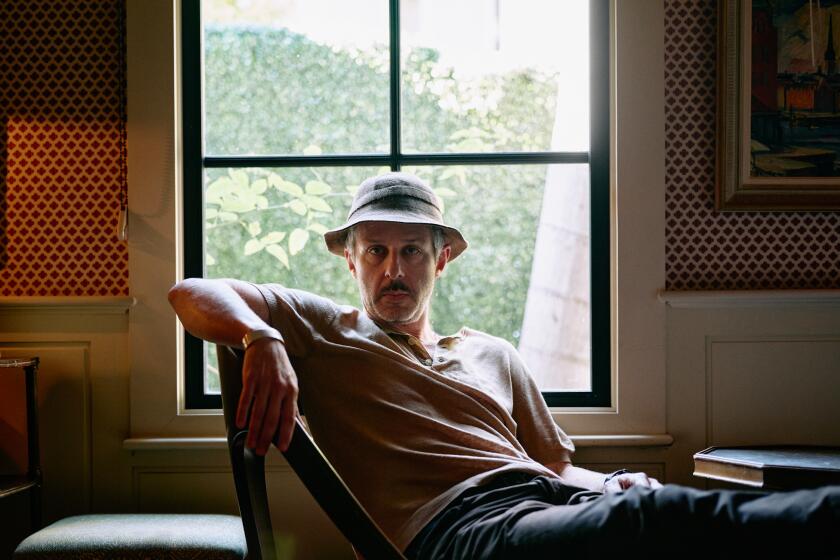Constance Cummings, 95; Film, Stage and TV Actress Known for Tony-Winning ‘Wings’ Role
Constance Cummings, an American actress who dazzled audiences on both sides of the Atlantic on stage and in such motion pictures as “Movie Crazy” and “Blithe Spirit,” has died. She was 95.
Cummings died Wednesday of natural causes in the Chelsea section of London. She had lived there since 1933, when she married British playwright and member of Parliament Benn Wolfe Levy. He died in 1973.
Cummings was a already a seasoned entertainer when, at 22, she appeared as an ingenue with twin personalities opposite Harold Lloyd in his semi-autographical “Movie Crazy” (1932).
The film “was very funny -- it still is -- and unlike many of the other things I did, stood the test of time,” the actress said in 1999. “ ‘Movie Crazy’ is what I’m best remembered for and what fans refer to the most. I did much better things but get a kick out of talking about the film and working with the genius that was Harold Lloyd.”
Cummings was remembered as Rex Harrison’s second wife, Ruth, in David Lean’s 1945 motion picture version of Noel Coward’s frothy “Blithe Spirit,” one of the films she made in England.
Cummings made most of her films in her youth and, although the beautiful blond ingenue matured into a fine character actress, she concentrated more on live theater as she grew older. She excelled on stage, working on Broadway, in London’s West End and with Laurence Olivier in Britain’s revered National Theatre.
Along with performing Shakespearean plays and other classics, she memorably appeared as Martha in Edward Albee’s “Who’s Afraid of Virginia Woolf?” in 1964 and opposite Olivier in Eugene O’Neill’s “Long Day’s Journey Into Night” in 1971.
For the latter role, as drug addicted Mary Tyrone, she received a London Theatre Critics Award as best actress. One British critic wrote for the Financial Times: “In Constance Cummings, a performance to travel across the country to see, you see the most delicate artistry.”
Cummings reprised her role in the ABC television version of the play in 1973 -- 40 years after her Hollywood heyday -- demonstrating her deepening acting ability for a new generation of Americans.
The actress soared to her professional zenith in 1979 when she received a Tony Award as best actress for her Broadway portrayal of a former daredevil aviatrix felled by a stroke in Arthur Kopit’s “Wings.” Cummings also won an Obie Award and a Drama Desk Award in the role.
She came to Los Angeles in 1983 to tape a Public Broadcasting Service version of “Wings” at the KCET-TV studios. The production was later broadcast on the network’s “American Playhouse.”
In 1986, Cummings toured Britain in a one-woman show, “Fanny Kemble,” and accepted roles into her late 80s in such plays as “The Chalk Garden” and “Uncle Vanya.”
“I’ve worked all my life ... and I still feel I ought to be working,” she told the London Evening Standard newspaper in 1992 when she was appearing in “The Chalk Garden.”
Then 82, she added: “I don’t remember things and names ... but I don’t find it difficult to remember lines.”
Born Constance Halverstadt on May 5, 1910, in Seattle, Cummings was the daughter of a lawyer and a concert soprano. She studied ballet but soon switched to acting and made her debut at age 16 in a stock-company production of “Seventh Heaven.”
Cummings made her Broadway debut in the chorus line of “Treasure Girl” in 1928. She moved quickly to a larger role in “The Little Show” in 1929 and the lead in “This Man’s Town” in 1930, earning an invitation to Hollywood from Samuel Goldwyn. After one false start -- Goldwyn fired her for poor acting -- she made her film debut as prison warden Walter Huston’s daughter in Howard Hawks’ 1931 movie “The Criminal Code.”
Columbia Studios’ Harry Cohn chose Cummings and 13 other starlets to promote as Wampas (an acronym for an organization of motion picture advertisers) Baby Stars. Aside from the massive publicity campaign, Cohn cast Cummings in several lackluster musicals, dramas and westerns.
“The acting bug that so gripped me early on,” she said a few years ago, “was squashed under the pressures of appearing in so much dross.”
Cummings made about 20 films in Hollywood, where she met Levy. Among her better roles were those opposite Huston in Frank Capra”s “American Madness” in 1932 and as the socialite who steals Ralph Bellamy from Irene Dunne in “This Man Is Mine” in 1934.
But after her marriage, she largely moved her career to England, frequently performing in plays written by her husband. She quickly gained acceptance on the London stage in an American comedy called “Sour Grapes” in 1934, earning the newspaper headline “Film Star Who Can Act.”
During World War II, Cummings performed in half a dozen productions for those serving in the military, while continuing to appear in West End theaters. She also acted on radio.
In later years, Cummings graced such British television series as “The Power Game” and “Craig’s Wife.” Her last appearance on American television was in a PBS telecast of “Love Song” for “Masterpiece Theater” in 1987.
Cummings is survived by her son, Jonathan; daughter, Jemina; and two grandchildren.
More to Read
Only good movies
Get the Indie Focus newsletter, Mark Olsen's weekly guide to the world of cinema.
You may occasionally receive promotional content from the Los Angeles Times.










